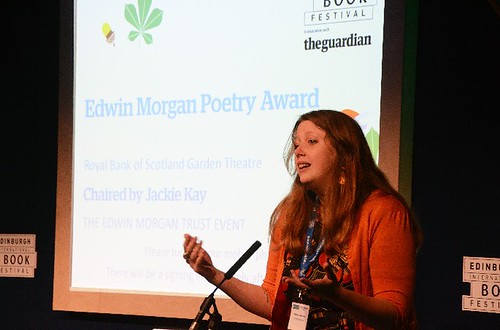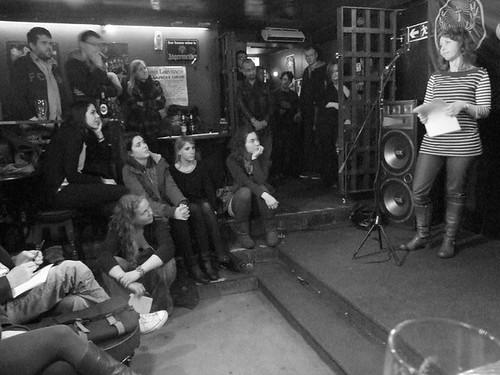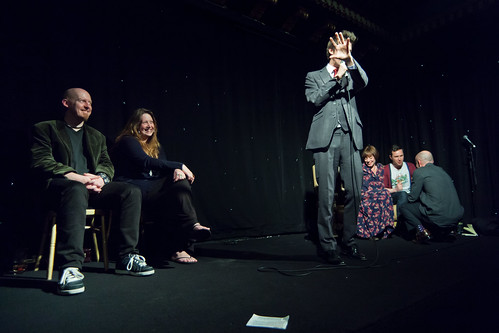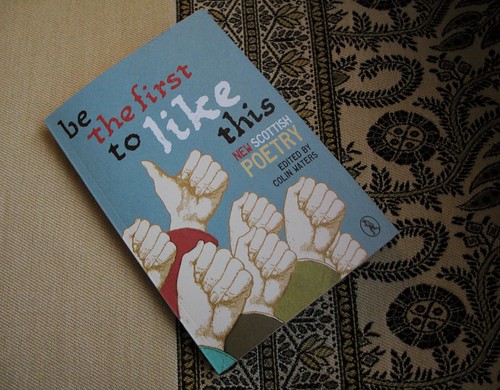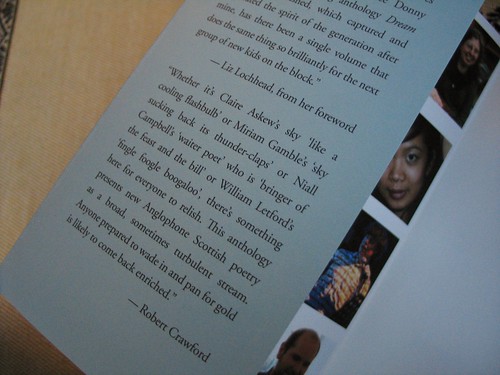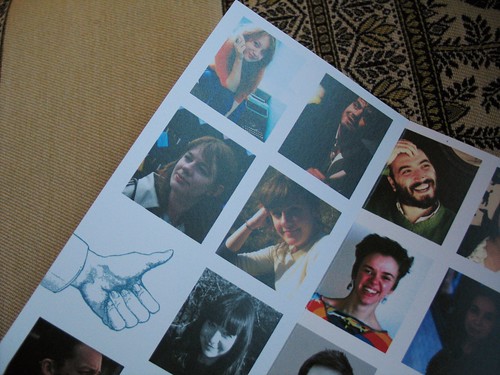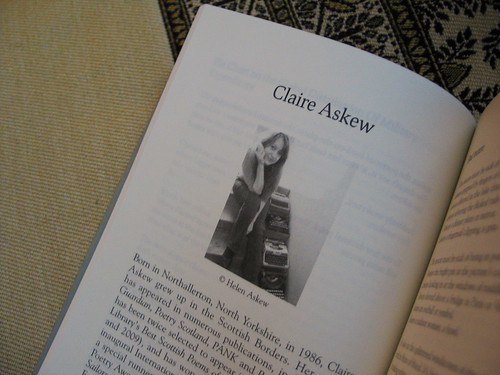
Eye to eye: Sally Evans and Elizabeth Burns, in Edinburgh in the 1990s.
I’m not sure whether I first met Lizzie Burns in Edinburgh at the First of May, Women Live, or the early School of Poets. Certainly I met her in all those milieus and whatever the circumstances we were soon good friends. It was the early 1980s.
Lizzie saw me as a feminist writer, while I saw her as one. She liked my young children and the way I tried to care for them, in addition to writing, and, I expect, my curiosity about what was going on. I was interested in her Scottish background, her poetry, and her feminist and bookselling friends. She was nearly twenty years younger than me, or I older, but that was never mentioned or indeed noticed. She was quiet and shy, quite the opposite of me, and with her quiet voice wouldn’t read her poems at events. She already had her characteristic grasp of phrase, together with a strong interest in people and their characters. We met in town and visited each other’s homes, and once I visited her parents’ home at Corstorphine. We shared new writing and gossip about our mutual friends, and went to cafes, Women Live events, School of Poets sessions in the Tweeddale Court building of the Poetry Library, etc. We were by no means exclusively friends with each other but we came to know each other very well.
The Poem for Peace was a joint project between us. Peace activists were prominent among the young people in Edinburgh and we capitalised on the number of poets one could then find lurking in Edinburgh places and pubs, by concocting a communal poem to be written by these poets on four rolls of plain wallpaper, which we lugged round from the Sandy Bells to Rose Street, the old Traverse building, and such places until we had 120 poets’ contributions, from the most eminent Edinburgh poets to the most casual, musicians, songwriters and more poets, all in holograph, scrawled on the wallpaper rolls. We laboriously typed out the MSS and submitted it to Canongate Publishers, then run by Stephanie Wolfe Murray, who kept it just long enough to send it up for a possible Arts Council grant, and then returned it, commenting that it was one of the few books of poetry that would actually sell. We considered publishing it ourselves but this was well before the days of diehard – I hadn’t met Ian then nor had Lizzie met Alan, though these events in our lives were to come very soon.
My marriage had been clearly unstable for a long time, although my children were young, and eventually my husband moved out of our house, at first into Lizzie’s old room in her flat in London Street – when she moved to her house in Tollcross.
A visit to the Lancaster area with my kids and Lizzie followed. My father, ill in old age, had vacated his house, at that point temporarily I think. We had a country holiday and Lizzie went off to visit Haworth on her own one day, coming back laden with research on the Brontës.
Changes happen fast in the cities and soon enough Ian and I had joined forces and were setting up Old Grindles Bookshop (which opened in 1987), while Lizzie’s interest the First of May, the left-wing co-operative bookshop, ran itself into the ground after ten successful years.
By 1997, when poems by Lizzie appeared in the first issues of Poetry Scotland, we were both much busier with other things and we saw less of each other, but were still in touch. Soon Lizzie and Alan Rice were calling into Grindles which was by now our Edinburgh daytime home. Lizzie next became a new mother, to her own and everyone’s delight. I went to a happy welcoming event for the baby in a hall near the Pleasance, where Hamish Henderson blessed the baby – no surprise that Alan and Lizzie knew Hamish well.
Next time I saw Lizzie, it was in Lancaster, where they had moved for Alan’s work, and where she now settled to a life of writing and bringing up her two daughters.
In 1999 we published her book The Gift of Light. (The Arts Council wanted us to call it Dragons in the Car Park, but we resisted.) Lizzie didn’t like Ian’s carefully chosen bold cover design, so we substituted a printed marbling design which filled the gap, but didn’t please anyone particularly well. Lizzie was an author who found working with publishers rather difficult. This was another effect of her retiring nature. Pamphlets, such as those she made with Galdragon Press, probably suited her better than working with any of her book publishers, Polygon, diehard, Shoestring and lastly again, Polygon
None the less, The Gift of Light showed Elizabeth’s progress, and the sustaining of her sensitive poetic style, and it undoubtedly filled its function as part of her oevre.
Alan and Elizabeth finally decided to get married and had a typically simple and happy wedding party on the beach at North Berwick, with her children in attendance and a private visit to her parents to follow. Here I met one of her potter friends, who was to play a part in her later poetry.
Because Elizabeth didn’t particularly like the internet – which fitted in with her shyness – our relationship had the old-fashioned characteristic of long intervals without being in touch at all. It was a major difference between us, that she was such a private and I such a public person. Yet determination and grit were not lacking in her make-up, for she always knew what she wanted and strove to achieve it.
We still met up after Ian and I moved on to Callander, when her family sometimes called during their trips to Scotland, and practically every year at StAnza where we both had many other friends, Elizabeth in fact being a St Andrews graduate. The first time they called at Callander, Lizzie’s daughters were joking that she couldn’t be called Elizabeth Burns Rice.
I have my own strong links with Lancaster – my family lived near there from my late teen years, my parents died there, & my brother recently bought back our home in Kirkby Lonsdale. Old memories include writing to enquire about a library job at the newly proposed Lancaster University, when the new Librarian, himself only just appointed, wrote back delighted that someone even knew he existed, though he at that time had no prospect of extra staff.
I was in Lancaster this summer when I had a phone call from my husband. Alan had telephoned to tell us of Lizzie’s death and the funeral. I was very shaken up. I had written to her a couple of months back – May or June – and had a small note in reply, which did not mention her illness. She knew I would now often be in Kirkby Lonsdale and the idea was we would meet up in Lancaster or Kirkby Lonsdale fairly soon. The occasion of my letter was her winning a prize in our Tinker’s Heart haibun competition, in which she wrote of her beloved Solway Firth. I had sent her a small card, hand printed by Gordon Chesterman, of Wordsworth’s Lucy poem. I have another copy of it in my kitchen and it’s a constant reminder of Lizzie.
It hadn’t been an active Edinburgh festival for us – the car was getting old, the traffic conditions less favourable within the city – parking had been suspended in some of my regularly used places, and we couldn’t get back to Callander without the car, particularly late at night. I knew she had an exhibition on but didn’t make it along. I did hear someone mention that Elizabeth was ill, but given my recent letter from her, I heard no alarm bells. Meanwhile her husband, daughters, sisters and mother had been supporting her through months of turmoil while she wrote, wrote and wrote.
I remember when John Cargill Thompson was very ill, I asked him, Can’t you write through it? And he replied, Don’t be silly! It struck me then, that the difference between a poet and other kinds of writers is that poets will write through experience, while other writers will not write while they are below par, though they may use their experience afterwards when they consider themselves in a fit state to write. Elizabeth wrote a whole booklet in her last months – Clay, and copies of it were available after her funeral, an event of light, garden flowers and youth, in the substantial Friends Meeting House in Lancaster.
*
Sally Evans is a poet, and publisher, editor and blogger of and about poetry. She has three collections of poetry, including The Bees (diehard, 2008). As a Gaelic learner, she has done translations from the Gaelic; she is the translator of the title poem in Christopher Whyte’s Bho Leabhar-Latha Maria Malibran/From the Diary of Maria Malibran (Acair, 2009). She is the editor of Poetry Scotland broadsheet, and lives in Callander, where she hosts the annual Callander Poetry Weekend.
Having spent much of her life in Scotland, Elizabeth Burns lived in Lancaster where she taught creative writing. She published four books and several pamphlets of poetry. Her publications inlcude Held (Polygon, 2010) and The Shortest Days (Galdragon Press, 2008), which won the inaugural Michael Marks Award for Poetry Pamphlets. Elizabeth passed away on 20th August this year.
*
